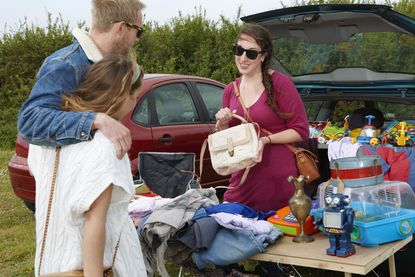Selling second-hand: do I need to pay tax?
If you declutter and sell second-hand, do you need to pay tax on the money you make?


Making extra cash selling second-hand can provide a much-needed income boost but is the taxman due a cut of the money you make?
Selling on eBay or Vinted are both easy ways to get started selling second-hand.
Depending on which site you use - you can sell anything from clothes to books and even larger items like furniture online.
And there are plenty of other sites you can use including Facebook Marketplace and Gumtree.
If you’re happy to get up early at weekends – you can always go along and pay for a pitch at your local car boot sale.
Alice Haine, personal finance analyst at Bestinvest said: “Households can make small sums of money from the clutter in their home and it is far more sustainable to give unwanted items a new life elsewhere than just dump them in the tip”.
Do I need to pay income tax when selling second-hand?
This can depend on whether you’re selling your personal belongings, or intentionally buying items with the aim of turning a profit.
Look After My Bills Newsletter
Get the best money-saving tips, tricks and deals sent straight to your inbox every week. Make sense of your money in partnership with The Money Edit.
A spokesperson for HM Revenue & Customs (HMRC) said: “If you are just selling unwanted items that have been lying around your home, it is unlikely you will have to pay tax”.
“In order to pay tax on the goods you sell, you either have to be trading or make a capital gain. If you are trading you will be self-employed.”
Sarah Hollowell, Tax & Trustee Services Director at Killik & Co said:
“There should be a distinction between someone who is selling stuff that’s been hoarded in the loft for many years and someone who might have built up a collection of valuable items they’ve held onto until their value increases - Lego is a very good example”.
Buying and selling second-hand for profit
If you are buying and selling with the aim of making a profit, say snapping up old furniture at boot fairs and revamping items to sell them on – this can be deemed as trade.
Sarah Hollowell says in this case, “you would need to register as self-employed with HMRC and pay income tax on profits you make”.
eBay itself recommend seeking, “professional advice about your tax obligations” if you sell on the site as a business.
What is the trading allowance?
Since 6 April 2017, individuals have been able to boost their income by earning an extra £1,000 a year tax-free.
This tax allowance is known as the Trading allowance and includes buying and selling online as well as money made from casual jobs like dog walking, babysitting, gardening or renting out your driveway.
You can earn £1,000 in each tax year this way. As a general rule, this means there is no need to tell HM Revenue & Customs or pay income tax on the money.
The trading allowance is in addition to your tax-free personal allowance. This is the amount you can earn before paying tax and is currently £12,570.
What should I do if I earn over the £1,000 trading allowance?
If your extra income is over £1,000 - you should contact HMRC to let them know as you may need to fill in a self-assessment tax return.
You may also need to pay tax on the extra income earned.
Capital gains tax when making big profits
It may seem unlikely that selling off unwanted items around the house could make you big money.
But, if you make a substantial profit when selling certain items - you could be liable for capital gains tax.
Alice Haine said: “If you make a profit when you sell or dispose of a personal possession worth £6,000 or more, such as jewellery, antiques, paintings, coins or stamps – but not your car – then you do need to consider the tax implication of that sale”.
- How to sell on eBay: a seller’s guide to the online marketplace
- How to sell on Vinted
- eBay vs Vinted – which is better for selling your pre-loved items
- How to turn your unwanted clothes into cash
- How to make some extra cash? 14 clever ways to boost your bank balance
- How to turn unwanted Christmas gifts into cash

Sue Hayward is a personal finance and consumer journalist, broadcaster and author who regularly chats on TV and Radio on ways to get more power for your pound. Sue’s written for a wide range of publications including the Guardian, i Paper, Good Housekeeping, Lovemoney and My Weekly. Cats, cheese and travel are Sue’s passions away from her desk!
-
 Three energy firms pay £8m in switching compensation - has your provider paid out?
Three energy firms pay £8m in switching compensation - has your provider paid out?More than 100,000 customers have received compensation after changing providers, but is now a good time to switch energy suppliers?
By Tom Higgins Published
-
 Save £300 on your supermarket shop with cashback accounts
Save £300 on your supermarket shop with cashback accountsBanks, credit card companies and cashback sites are all offering cashback on your supermarket shop, but can you use them all to max out your savings?
By Vaishali Varu Published
-
 Save on petrol: how to save 5p off a litre of fuel at Morrisons
Save on petrol: how to save 5p off a litre of fuel at MorrisonsPetrol prices may have been falling since last summer but every penny counts at the pump. Here’s how to save 5p a litre at Morrisons for a limited time
By Sue Hayward Published
-
 Morrisons relaunches discount scheme with cheaper prices for loyal shoppers
Morrisons relaunches discount scheme with cheaper prices for loyal shoppersMorrisons is the latest supermarket to revamp prices and offers for its loyalty scheme members
By John Fitzsimons Published
-
 Coronation freebies and discounts: what’s up for grabs
Coronation freebies and discounts: what’s up for grabsFrom free railcards and holiday giveaways to discounts off food, we highlight the special offers launched to mark the coronation of King Charles III
By Ruth Emery Last updated
-
 8 ways to get interest-free money if you’re struggling
8 ways to get interest-free money if you’re strugglingHere are 8 clever ways to get interest-free income if you’re struggling with the rising cost of living
By Vaishali Varu Last updated
-
 Best birthday freebies and discounts
Best birthday freebies and discountsEnjoy your special day with these birthday discounts and freebies - we highlight 22 of the best offers
By Vaishali Varu Published
-
 Festival ticket scam warnings – how to protect yourself
Festival ticket scam warnings – how to protect yourselfConcert ticket scams have rocketed by more than 500% over the past year, while festival fraud has more than doubled. Here’s how to keep yourself safe ahead of the festival season.
By Tom Higgins Published
-
 Co-op Member Prices: Supermarket unveils discount scheme for loyal shoppers
Co-op Member Prices: Supermarket unveils discount scheme for loyal shoppersNew Co-op scheme means reduced prices for shoppers who join the co-operative. How much does it cost to join, and how does it compare to similar schemes run by Sainsbury’s and Tesco?
By John Fitzsimons Published
-
 Emergency alert test: what to expect and how to avoid being scammed
Emergency alert test: what to expect and how to avoid being scammedWe tell you everything you need to know about the UK’s first emergency alert test, which takes place this Sunday
By Vaishali Varu Published